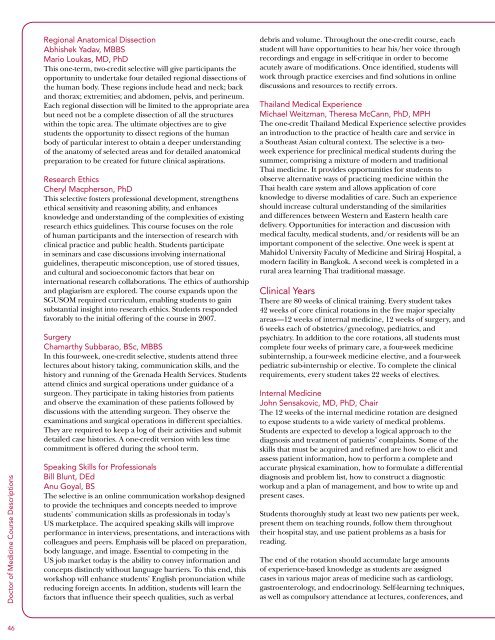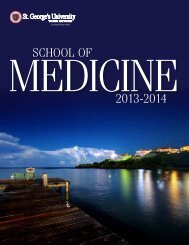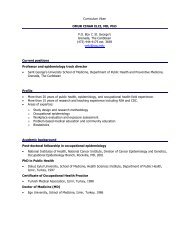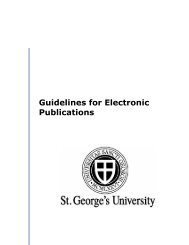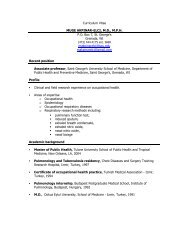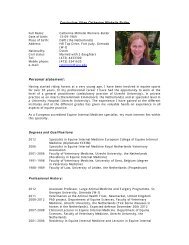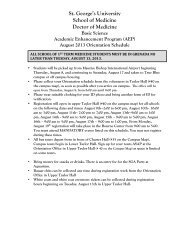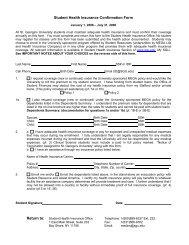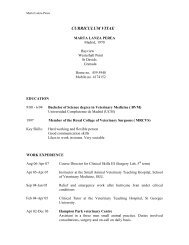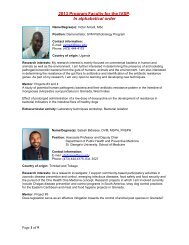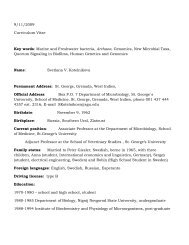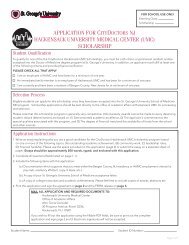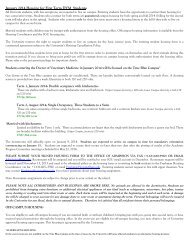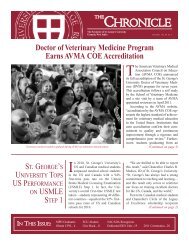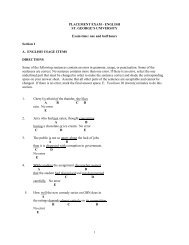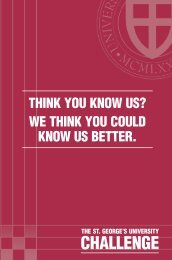ST. GEORGE'S UNIVERSITY ⢠School of Medicine 2010-2011
ST. GEORGE'S UNIVERSITY ⢠School of Medicine 2010-2011
ST. GEORGE'S UNIVERSITY ⢠School of Medicine 2010-2011
Create successful ePaper yourself
Turn your PDF publications into a flip-book with our unique Google optimized e-Paper software.
Doctor <strong>of</strong> <strong>Medicine</strong> Course Descriptions<br />
Regional Anatomical Dissection<br />
Abhishek Yadav, MBBS<br />
Mario Loukas, MD, PhD<br />
This one-term, two-credit selective will give participants the<br />
opportunity to undertake four detailed regional dissections <strong>of</strong><br />
the human body. These regions include head and neck; back<br />
and thorax; extremities; and abdomen, pelvis, and perineum.<br />
Each regional dissection will be limited to the appropriate area<br />
but need not be a complete dissection <strong>of</strong> all the structures<br />
within the topic area. The ultimate objectives are to give<br />
students the opportunity to dissect regions <strong>of</strong> the human<br />
body <strong>of</strong> particular interest to obtain a deeper understanding<br />
<strong>of</strong> the anatomy <strong>of</strong> selected areas and for detailed anatomical<br />
preparation to be created for future clinical aspirations.<br />
Research Ethics<br />
Cheryl Macpherson, PhD<br />
This selective fosters pr<strong>of</strong>essional development, strengthens<br />
ethical sensitivity and reasoning ability, and enhances<br />
knowledge and understanding <strong>of</strong> the complexities <strong>of</strong> existing<br />
research ethics guidelines. This course focuses on the role<br />
<strong>of</strong> human participants and the intersection <strong>of</strong> research with<br />
clinical practice and public health. Students participate<br />
in seminars and case discussions involving international<br />
guidelines, therapeutic misconception, use <strong>of</strong> stored tissues,<br />
and cultural and socioeconomic factors that bear on<br />
international research collaborations. The ethics <strong>of</strong> authorship<br />
and plagiarism are explored. The course expands upon the<br />
SGUSOM required curriculum, enabling students to gain<br />
substantial insight into research ethics. Students responded<br />
favorably to the initial <strong>of</strong>fering <strong>of</strong> the course in 2007.<br />
Surgery<br />
Chamarthy Subbarao, BSc, MBBS<br />
In this four-week, one-credit selective, students attend three<br />
lectures about history taking, communication skills, and the<br />
history and running <strong>of</strong> the Grenada Health Services. Students<br />
attend clinics and surgical operations under guidance <strong>of</strong> a<br />
surgeon. They participate in taking histories from patients<br />
and observe the examination <strong>of</strong> these patients followed by<br />
discussions with the attending surgeon. They observe the<br />
examinations and surgical operations in different specialties.<br />
They are required to keep a log <strong>of</strong> their activities and submit<br />
detailed case histories. A one-credit version with less time<br />
commitment is <strong>of</strong>fered during the school term.<br />
Speaking Skills for Pr<strong>of</strong>essionals<br />
Bill Blunt, DEd<br />
Anu Goyal, BS<br />
The selective is an online communication workshop designed<br />
to provide the techniques and concepts needed to improve<br />
students’ communication skills as pr<strong>of</strong>essionals in today’s<br />
US marketplace. The acquired speaking skills will improve<br />
performance in interviews, presentations, and interactions with<br />
colleagues and peers. Emphasis will be placed on preparation,<br />
body language, and image. Essential to competing in the<br />
US job market today is the ability to convey information and<br />
concepts distinctly without language barriers. To this end, this<br />
workshop will enhance students’ English pronunciation while<br />
reducing foreign accents. In addition, students will learn the<br />
factors that influence their speech qualities, such as verbal<br />
debris and volume. Throughout the one-credit course, each<br />
student will have opportunities to hear his/her voice through<br />
recordings and engage in self-critique in order to become<br />
acutely aware <strong>of</strong> modifications. Once identified, students will<br />
work through practice exercises and find solutions in online<br />
discussions and resources to rectify errors.<br />
Thailand Medical Experience<br />
Michael Weitzman, Theresa McCann, PhD, MPH<br />
The one-credit Thailand Medical Experience selective provides<br />
an introduction to the practice <strong>of</strong> health care and service in<br />
a Southeast Asian cultural context. The selective is a twoweek<br />
experience for preclinical medical students during the<br />
summer, comprising a mixture <strong>of</strong> modern and traditional<br />
Thai medicine. It provides opportunities for students to<br />
observe alternative ways <strong>of</strong> practicing medicine within the<br />
Thai health care system and allows application <strong>of</strong> core<br />
knowledge to diverse modalities <strong>of</strong> care. Such an experience<br />
should increase cultural understanding <strong>of</strong> the similarities<br />
and differences between Western and Eastern health care<br />
delivery. Opportunities for interaction and discussion with<br />
medical faculty, medical students, and/or residents will be an<br />
important component <strong>of</strong> the selective. One week is spent at<br />
Mahidol University Faculty <strong>of</strong> <strong>Medicine</strong> and Siriraj Hospital, a<br />
modern facility in Bangkok. A second week is completed in a<br />
rural area learning Thai traditional massage.<br />
Clinical Years<br />
There are 80 weeks <strong>of</strong> clinical training. Every student takes<br />
42 weeks <strong>of</strong> core clinical rotations in the five major specialty<br />
areas—12 weeks <strong>of</strong> internal medicine, 12 weeks <strong>of</strong> surgery, and<br />
6 weeks each <strong>of</strong> obstetrics/gynecology, pediatrics, and<br />
psychiatry. In addition to the core rotations, all students must<br />
complete four weeks <strong>of</strong> primary care, a four-week medicine<br />
subinternship, a four-week medicine elective, and a four-week<br />
pediatric sub-internship or elective. To complete the clinical<br />
requirements, every student takes 22 weeks <strong>of</strong> electives.<br />
Internal <strong>Medicine</strong><br />
John Sensakovic, MD, PhD, Chair<br />
The 12 weeks <strong>of</strong> the internal medicine rotation are designed<br />
to expose students to a wide variety <strong>of</strong> medical problems.<br />
Students are expected to develop a logical approach to the<br />
diagnosis and treatment <strong>of</strong> patients’ complaints. Some <strong>of</strong> the<br />
skills that must be acquired and refined are how to elicit and<br />
assess patient information, how to perform a complete and<br />
accurate physical examination, how to formulate a differential<br />
diagnosis and problem list, how to construct a diagnostic<br />
workup and a plan <strong>of</strong> management, and how to write up and<br />
present cases.<br />
Students thoroughly study at least two new patients per week,<br />
present them on teaching rounds, follow them throughout<br />
their hospital stay, and use patient problems as a basis for<br />
reading.<br />
The end <strong>of</strong> the rotation should accumulate large amounts<br />
<strong>of</strong> experience-based knowledge as students are assigned<br />
cases in various major areas <strong>of</strong> medicine such as cardiology,<br />
gastroenterology, and endocrinology. Self-learning techniques,<br />
as well as compulsory attendance at lectures, conferences, and<br />
46


